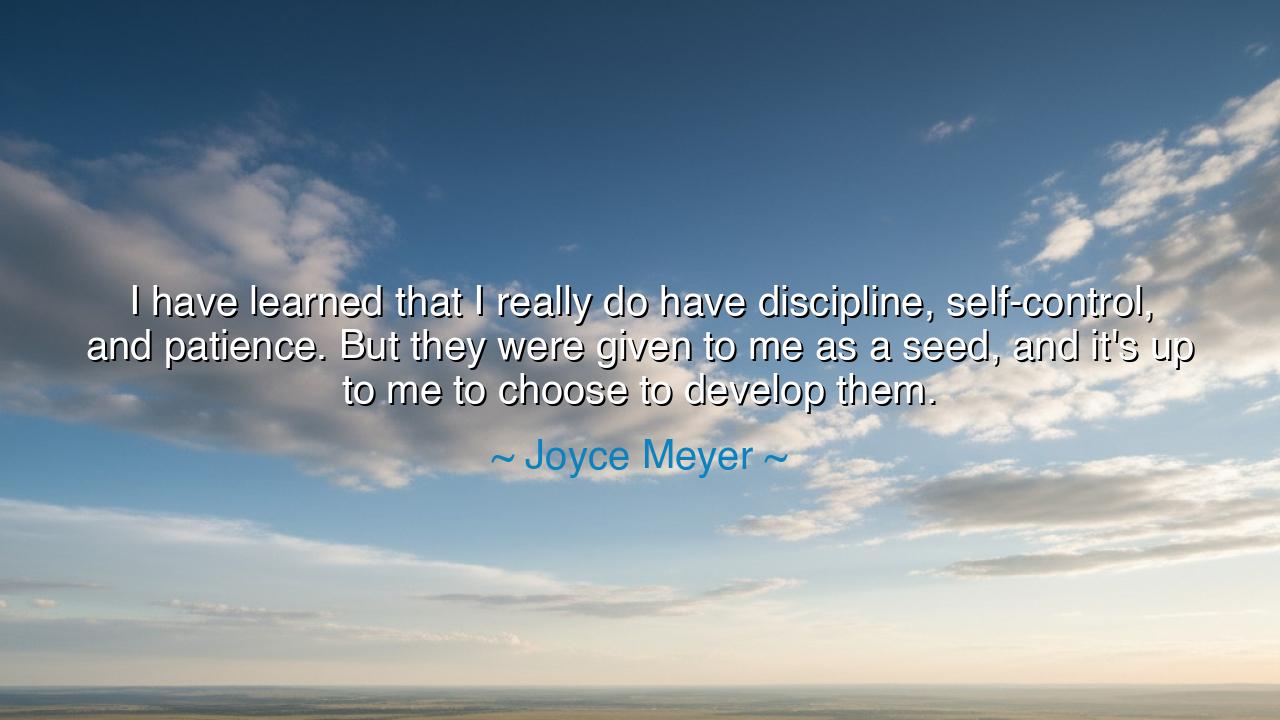
I have learned that I really do have discipline, self-control
I have learned that I really do have discipline, self-control, and patience. But they were given to me as a seed, and it's up to me to choose to develop them.






Joyce Meyer once spoke with clarity of spirit: “I have learned that I really do have discipline, self-control, and patience. But they were given to me as a seed, and it's up to me to choose to develop them.” In these words lies a truth older than kingdoms and deeper than stone: that virtues are not bestowed fully formed, but are planted within us as seeds. Each soul is given the raw potential for greatness, yet it is the labor of the heart, the choices of daily life, and the persistence of will that cause these seeds to grow into enduring strength.
The origin of her words rests in her long journey of faith, teaching, and personal struggle. Joyce Meyer, as a Christian teacher and speaker, often speaks of transformation not as a sudden gift, but as a gradual process—one where discipline, self-control, and patience must be cultivated deliberately. Her confession reminds us that even the strongest virtues are fragile at first, like tender shoots vulnerable to neglect. They do not blossom because they exist; they blossom because they are nurtured.
History offers us shining examples of this truth. Consider Mahatma Gandhi, who did not begin as a saint of nonviolence, but as a young man struggling with fear and self-doubt. Over years of practice, suffering, and self-reflection, he cultivated the discipline of restraint, the self-control to withstand provocation, and the patience to endure imprisonment and injustice. His virtues were not accidents of birth, but seeds watered through choice and perseverance, until they grew mighty enough to shake an empire.
Meyer’s metaphor of the seed reminds us also of the natural law: no farmer expects a harvest without tilling the soil, watering, and waiting. Likewise, no person may expect the fruits of virtue without effort. To be given a seed is a gift, but to make it flourish is responsibility. The seed of patience may lie within a child, but unless tested by trials and watered with endurance, it remains dormant. The seed of discipline may be given to every soul, but unless chosen again and again, it bears no fruit.
The deeper meaning here is that choice is the turning point of destiny. Many believe they lack discipline or patience because they do not see it already in full bloom. But Meyer teaches that the seed is already present; the power lies in the decision to cultivate. Growth is not instant, nor is it easy, but it is always possible. Thus no one may say, “I cannot change,” for within each is the seed of change waiting to be nourished.
This wisdom also carries a heroic undertone: that true strength is not bestowed like a crown, but forged through struggle. A warrior is not born with courage; he chooses courage until it becomes part of his soul. A leader is not born with patience; she chooses patience until it governs her words and deeds. So too with every virtue—discipline, self-control, patience—all are gifts in seed form, but they demand the hand of the cultivator.
The lesson for us is clear: tend to your inner garden. Do not neglect the seeds within, nor compare your growth to that of others. Instead, water daily with choices that strengthen virtue: rise early when sloth tempts you, hold your tongue when anger rises, wait calmly when impatience whispers. Each small act feeds the seed, and over time, the tree of character grows strong enough to provide shade to others.
Thus, let this truth echo through the ages: you already carry within you the seeds of greatness. Joyce Meyer’s words remind us that discipline, self-control, and patience are not unreachable treasures, but gifts entrusted to your care. Nurture them, and they will grow. Abandon them, and they will wither. The harvest of your life depends not on what you have been given, but on what you choose to grow.






AAdministratorAdministrator
Welcome, honored guests. Please leave a comment, we will respond soon